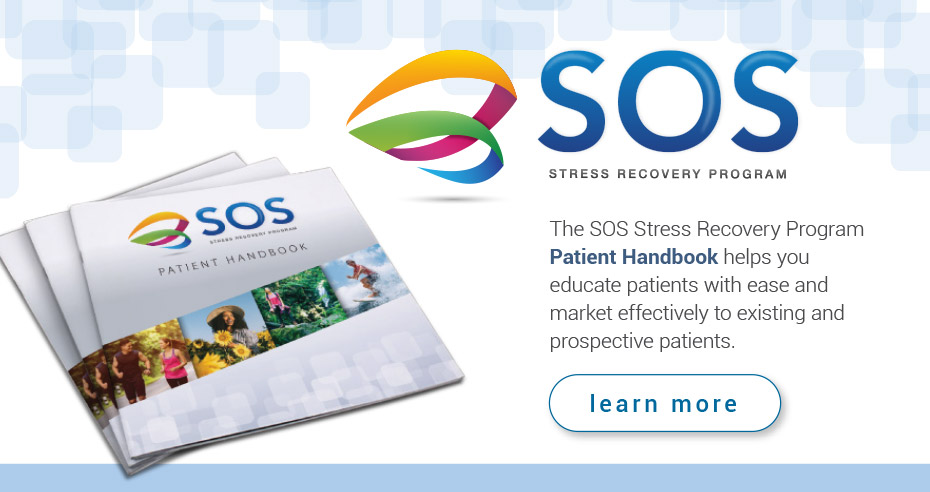Your patients’ stress stems from many different sources,1 and there is no one-size-fits-all approach to mitigating it. Nutrition is a powerful tool that, when implemented strategically, can help restore key nutrients depleted by chronic stress. In addition, nutrition can help build resiliency to feelings of overwhelm and anxiety, especially when paired with lifestyle interventions. Read on to learn the most common nutrients depleted by stress and clinical strategies to replenish them.
Signs and Symptoms of Stress
The most obvious signs of stress are irritability, overwhelm and anxiety. But patients may also complain about fatigue, weight gain, gastrointestinal issues and sleep disturbances. Cortisol, epinephrine and norepinephrine are released under stress and are all responsible for increased energy, for example, if you are running away from danger. This chemical response causes an increase in heart rate, blood pressure and respiratory rate. These are important as long as you’re able to recuperate, however, when stress occurs too often, patients experience jitteriness, start forgetting where they left their keys or why they walked into a room, or have more frequent viral infections and blood sugar fluctuation. Keep this in mind when a patient walks into your office who otherwise presented as calm, cool and collected.
Vital Nutrients Depleted by Stress
In cases of high stress, the overproduction of cortisol can deplete vitamin C, as it plays an important role in supporting the metabolism of cortisol. The mineral magnesium also helps regulate cortisol levels,2 while vitamins B6, B12 and folic acid3 are utilized in this process as precursors to cortisol and conversion factors. Stress on the system in general consumes antioxidants including vitamins A and E, and the minerals calcium, selenium and zinc.4 These depletions can lead to increased oxidative stress and free radical damage due to the lack of antioxidants available to fend off other toxins and infection.
How to Replenish Nutrients and Support the Stress Response
Along with replenishing the vitamins5 and minerals mentioned above, consider providing your patients with solutions to promote relaxation, increase focus and improve stress resilience.
- GABA and L-theanine: Gamma-aminobutyric acid (GABA)6 and L-theanine7 are a powerful combination that promote an increase in alpha brain wave activity for calming and a decrease in beta brain waves responsible for scattered thoughts. Together, they help soothe stress and calm the nervous system without causing drowsiness.
- 5-HTP8,9: This amino acid directly converts into the calming and mood-regulating neurotransmitter serotonin.
- Phosphatidylserine: This phospholipid is found in high concentrations in the brain. Supplemental phosphatidylserine has been shown to reduce elevated cortisol levels by decreasing excess release of cortisol.10
- Huperzine A: To improve focus, learning and memory, huperzine A acts as an acetylcholinesterase inhibitor.11,12
- Adaptogens: Adaptogens support the body’s resistance to stress. A blend of adaptogens provides the benefits of balancing cortisol levels, promoting a positive mood, reducing fatigue and enhancing the immune system.
Case Study
Patient Presentation
A patient presents to your office with daytime anxiety and evening restlessness. They work an excessive number of hours and this bleeds into late-night work sessions. Their overall demeanor is what they describe as “Type A” personality and describe feeling wired. They are used to being able to handle everything that comes their way and are irritated that they feel overwhelmed for seemingly no reason.
First Office Visit
You determine the patient will benefit from evaluating their hypothalamus-pituitary-adrenal (HPA) axis as you would like a clear picture of their salivary cortisol awakening response (CAR) and diurnal cortisol (daily pattern). You send them home with a calming solution to help support their daytime anxiety. This includes GABA, L-theanine and 5-HTP split dose between morning and evening.
Second Office Visit
Their test results reveal an elevated CAR (the first three cortisol samples taken upon awakening) and an elevated bedtime cortisol level. You prescribe an adaptogen blend to be taken twice a day, immediately upon awakening and an hour before lunch. The patient continues the calming blend in the evening especially on evenings they are working late.
Protocol Summary and Lifestyle Management
This patient will benefit from calming support along with lifestyle management. Therapy should include the calming support for anxiety and the inclusion of adaptogens upon receiving test results of high cortisol. The supplementation will help support the stress response and stress perception, but impress the importance of lifestyle management with these patients. Provide your favorite relaxation techniques, such as going for a walk outside, calling a friend, or reading a good book to stay away from blue light before bed. They have the illusion they are invincible and if stress of this magnitude is left unchecked, they will spiral into worsening symptoms.
The Bottom Line
Stress leads to a multitude of health consequences, from nutrient deficiencies to decreased immune system function. Fortify your patients with the proper stress-buffering nutrients, calming agents and lifestyle management. And then don’t be afraid to ask them to refer all their overworked colleagues once they have learned a work-life balance routine from you!
References
- Chu B, Marwaha K, Sanvictores T, et al. Physiology, Stress Reaction. [Updated 2021 Sep 18]. In: StatPearls [Internet]. Treasure Island (FL): StatPearls Publishing; 2021 Jan. Available from:https://www.ncbi.nlm.nih.gov/books/NBK541120/
- Boyle, N. B., Lawton, C., & Dye, L. (2017). The effects of magnesium supplementation on subjective anxiety and stress—A systematic review. Nutrients,9(5), 429.
- Stough, C., Simpson, T., Lomas, J., McPhee, G., Billings, C., Myers, S., … Downey, L. A. (2014). Reducing occupational stress with a B-vitamin focussed intervention: A randomized clinical trial: study protocol. Nutrition Journal, 13(1), 122.
- Kaplan, Bonnie J, Crawford, et al. Vitamin, minerals, and mood. Psychological Bulletin 2007; Vol 133(5):747-760.
- Young, L. M., Pipingas, A., White, D. J., Gauci, S., & Scholey, A. (2019). A systematic review and meta-analysis of B vitamin supplementation on depressive symptoms, anxiety, and stress: Effects on healthy and ‘at-risk’ individuals. Nutrients, 11(9), 2232.https://doi.org/10.3390/nu11092232
- Abdoua AM, Higashiguchi S, Horie K, et al. Relaxation and immunity enhancement effects of ?-Aminobutyric acid (GABA) administration in humans. BioFactors 2006;26: 201-208.
- Williams, J. L., Everett, J. M., D’Cunha, N. M., Sergi, D., Georgousopoulou, E. N., Keegan, R. J., … Naumovski, N. (2019). The effects of green tea amino acid L-Theanine consumption on the ability to manage stress and anxiety levels: A systematic review. Plant Foods for Human Nutrition, 75(1), 12–23.
- Neil MF, Moore NA. Animal models of depression: are there any? Human Psychopharmacology 2003;18:239-254.
- Birdsall TC. 5-Hydroxytryptophan: a clinically-effective serotonin precursor. Altern Med Review 1998;(3)4:271-1998.
- Monteleone P, Maj M, et al. Blunting by chronic phosphatidylserine administration of the stress-induced activation of the hypothalamo-pituitary-adrenal axis in healthy men. Eur J Clin Pharmacol 1992; 42(4):385-388.
- Wang R, Yan H, Tang XC. Progress in studies of huperzine A, a natural cholinesterase inhibitor from Chinese herbal medicine. Acta Pharmacol Sin. 2006 Jan;27(1):1-26. [PMID: 16364207].
- Sun QQ, Xu SS, Pan JL, Guo Hm, Cao WQ. Huperzine-A capsules enhance memory and learning performance in 34 pairs of matched adolescent students. Chung Kuo Yao Li Hsueh Pao. 1999 Jul;20(7):601-3.

Stacey Smith, DC
Stacey Smith, DC earned her doctorate in chiropractic from the National University of Health Sciences (NUHS) in Lombard, Illinois in 2004.?She obtained two bachelor of science degrees, biochemistry from Michigan State University and human biology from NUHS.?She worked alongside her chiropractic parents and brother in a family practice in Michigan for 16 years and focused on lifestyle and physical medicine.?She continues her education of integrative evaluation and treatment practices through functional medicine coursework and utilizes her research and clinical background as the SOS Stress Recovery Program Brand Manager.




